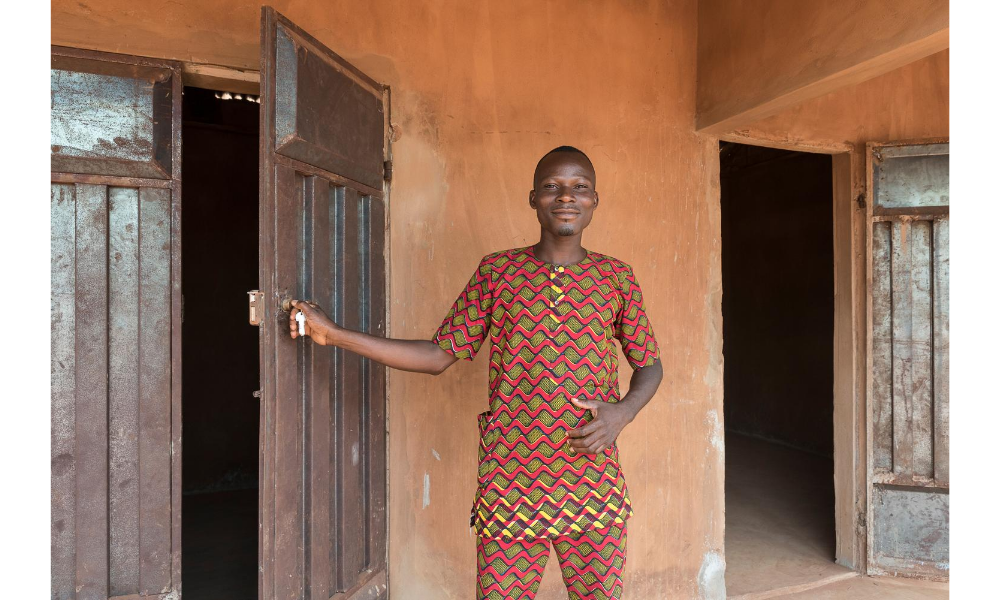In 2012 freelance journalist Mariken Stolk and photographer Johannes Odé visited The Hunger Project Zakpota epicentre in Benin and met Fulbert. Five years later they went back. What progress has been made?
A new studio and sewing machines.
Five years ago we met Fulbert Egbekan (32) in his small sewing studio. When we walk up, this time, we see that it is gone. Fulbert takes us further down the road to a new and bigger building: the sewing studio, which he has built. “I cannot wait to move in,” he says, when he proudly shows us around, “It is such an improvement! And, you know, I am having it built from the profit I have made with my business! I didn’t need to take a loan.”

Professional training.
Fulbert knows exactly how he will design the new studio. “In this building I will have two separate spaces. In one I will put the embroidery sewing machines, in the other the ordinary ones. By now I have six ordinary sewing machines and one embroidery machine. So, my dream, you may remember, to own seven of them, has come true! However, before long I will get a second embroidery machine.
I have been able to buy the sewing machines without a loan, too, because my small company is profitable enough. Unfortunately, I cannot hire people yet, but I do have twelve students working for me - four more than I had five years ago. These students pay me a tuition fee, which is a good addition to my income. And I really enjoy teaching my craft. After they complete their training, the students get an official diploma from the Guild for Tailoring.”

Embroidery and funerals.
Eventually Fulbert wants to buy another two embroidery machines. “These are twice as costly as an ordinary sewing machine. They cost 200,000 CFA (300 euro). However, they bring in a lot of money. For special events like funerals, people want to look their best. In my culture, that means heavily embroidered clothing. It’s a very profitable business. In your tradition marriages are the most important - to us funerals are. For a funeral people throw big parties and all guests chip in financially to give the deceased a worthy farewell. Beautiful embroidery, where every separate part is often made from the same cloth, is part of that.” Smiling broadly, Fulbers says: “And that keeps me busy!”

Self-reliance.
Fulbert still profits from the Vision Commitment Action workshops he attended in the past. “One of the things I have learned is how important it is to diversify your income. That is why I have also bought a small 2-acre field. I grow beans, peanuts and corn, partly for myself and my family, but most of the crops I sell at the market. I also keep chickens. When you were here five years ago, a couple of young men from our village and I had just started chicken farming. But business was so good, that before long we could all start our own business. So now I have my own chicken farm.”

Fulbert was chosen chairman of the youth group in his village, which is part of The Hunger Project (THP) Zakpota epicentre. “THP taught us a lot on poultry farming, for instance, and on growing, processing and using moringa. So we planted moringa trees and it won’t be long before we can start drying the leaves and then grind them into a powder to sell. However, they mostly taught us how to manage our income. We still meet every month to share our experiences."
"If someone has a problem, we try to solve it together. We also try to convince those who want to emigrate to Nigeria or further, to stay. It’s much better to stay and improve your own situation. I have many ideas on how we can improve the situation for us, young people. We could, for instance, start making orange juice from the fruit of the many orange trees that are growing here. I think you could earn a good income with that.”
A place of his own.
Five years ago, Fulbert, his wife Bernadette Rassike and their two children lived with his parents. Now, they have four kids and the family lives in a rented cottage next to the temporary sewing studio, Fulbert is using while his new studio is built. Fulbert’s next project is the building of his own house. “I am saving part of the profit from my sewing studio. I already bought a plot of land. I am going to make the bricks myself and before long I will have our house built. I am so happy that we will finally have our own place!”

Invest in the leadership and potential of people to shape their own future!
Photo credit: Johannes Ode







